Casio Pro Trek Smart WSD-F20 review
The rugged and chunky Pro Trek Smart WSD-F20 is Casio’s second attempt at an adventure-loving Android smartwatch for people who like to hike the hills, paddle up stream and generally get off the grid.
A replacement for the Casio Smart Outdoor Watch WSD-F10, the WSD-F20 looks almost identical to its predecessor, although it’s slightly thinner. The major headline upgrade here, though, is the inclusion of built-in GPS, so now you can take on the great outdoors without your phone. That’s an improvement but something you’d really have expected in the first generation.
Even though at £450/$500 (around AU$650) it’s got a price tag that puts it up there with the top-end timepieces in the big smartwatch line-up, the Casio Pro Trek Smart shouldn’t really be compared to mainstream everyday devices like the Apple Watch 3 or those Android Wear watches such as the LG Watch Sport.
This is a niche device that will appeal only to those who like to get a bit of dirt under their nails outdoors and is more at home up against the likes of the Nixon Mission, and non-Android sport watches from the likes of Suunto and Garmin.
Fortunately for Casio, there aren’t too many true smartwatch alternatives that cater for the outdoors and that makes the Trek’s combination of Wear OS smart features plus tracking for hiking, canoeing, snow sports, cycling, skiing and, um, fishing, a consideration. However, you’ll also want to seriously look at regular outdoor watches that come with some smart features too.
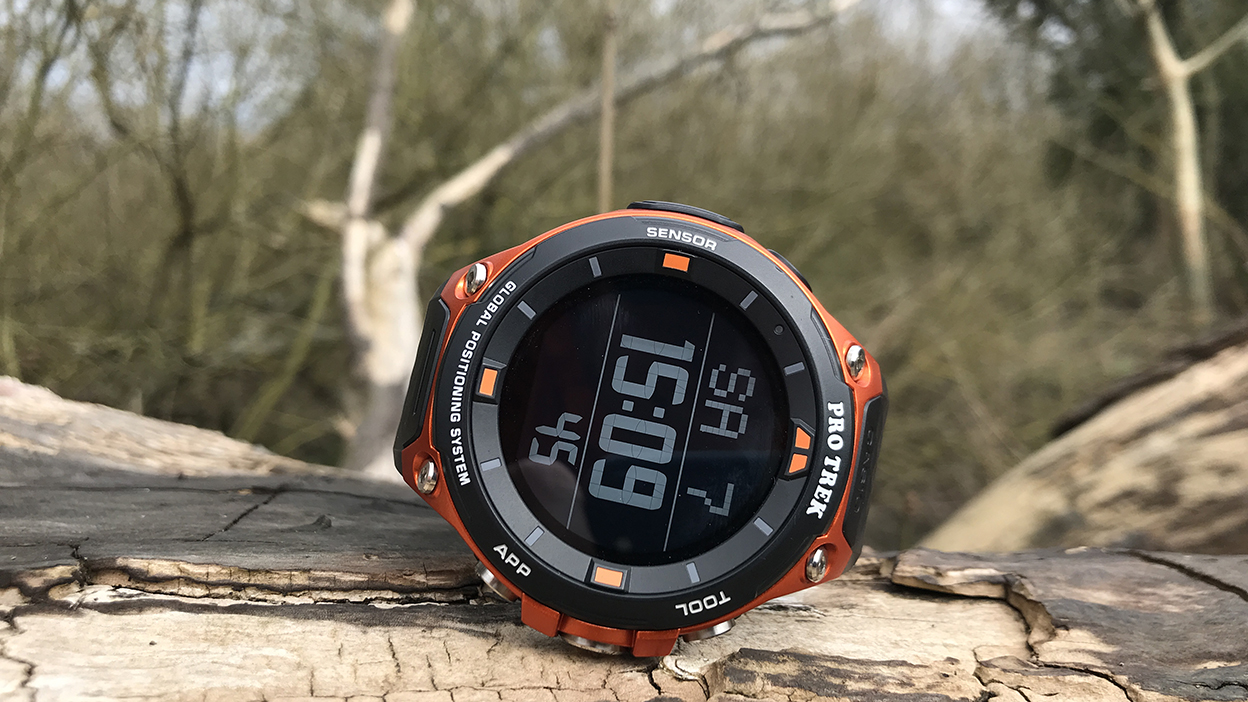
Design and screen
- GPS connectivity but no heart rate or NFC
- Supports both Bluetooth and Wi-Fi
- Compatible with Android 4.3 or later and iOS 9.0 or later
The Casio Pro Trek Smart is unapologetically an outdoor watch. There’s no subtlety here. It’s a hulking great thing for a start, and measuring in at 61.7 x 56.4 x 15.7mm it’s quite noticeably bulkier than a rival Suunto Traverse or the Garmin Fenix 5X.
Its chunky faux metal finish plastic casing, paired with an oversized black protective bezel – complete with silver metal stud screws – makes the whole thing look a bit like a watch that’s wearing Iron Man’s armor.
It screams rugged from about 100 feet away and as outdoor watches go, it’s not entirely unattractive. But unless you’re Bear Grylls going to a big meeting, you probably won’t want to wear this with your suit to work, not least because it won’t fit under the cuff of your shirt but also because it’s heft makes it quite hard to type.
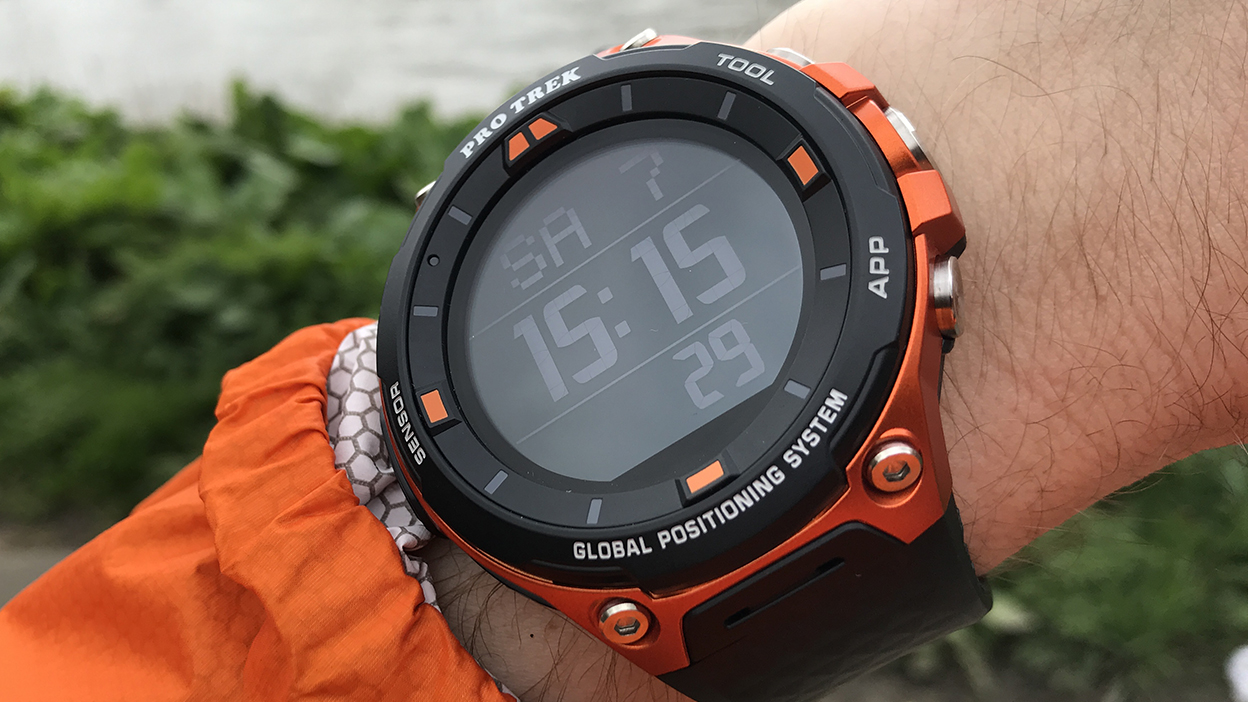
Inside the big bezel sits a 1.32-inch dual-layer touchscreen display that's nice and responsive with fast, smooth transitions between screens and features. It can also be cleverly flicked between color and monochrome for power saving. (It does this automatically once the power gets low).
We loved this feature for its battery conservation smarts but that’s about all we like about this screen. Even with five levels of adjustable screen brightness, we found the slightest bit of light on the screen made it largely impossible to read in all kinds of daylight conditions which is a huge problem for an outdoor watch.
At 92g it’s heavier than something like the Suunto Traverse (80g) and the Garmin Fenix 5 (82g) too, and the version we tested, with the inflexible and rigid standard watch band, was far from a comfortable fit. Harder wearing maybe, but for a watch designed to be worn for long periods while you’re trekking or taking on long adventures, it really came up short.
In terms of physical controls, the Casio Pro Trek Smart WSD-F20 features three big side buttons on the right of the watch – Tool, Power and App – which are all easy to find on the move if a little soft and unresponsive on the press.
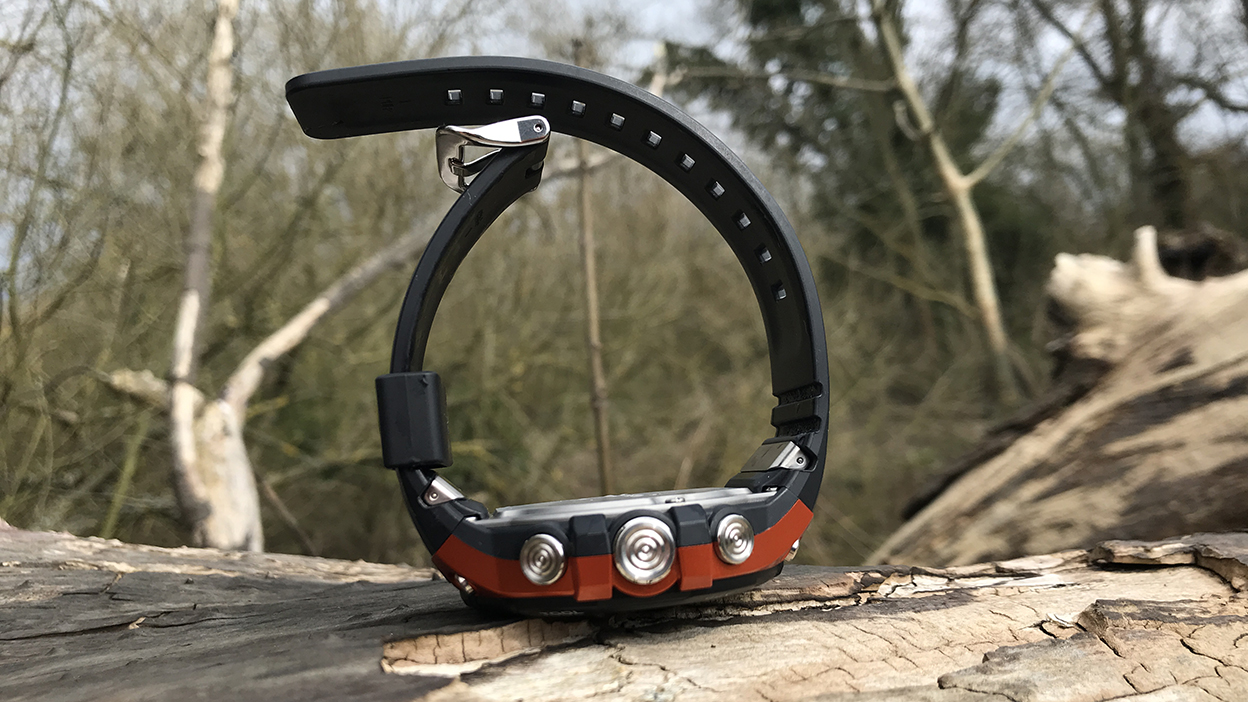
The Power button, which also returns you to the home screen, is neatly protected by two button guards to stop any accidental shutdown. Meanwhile the Tool and App buttons can be assigned to different functions, but initially Tool launches the Compass and the App button loads up the maps.
Under the hulking great hood there’s a host of sensors including a pressure sensor for air pressure and altitude, an accelerometer, gyrometer and magnetic compass.
As you’d expect from an adventure watch, durability is key, and the Pro Trek Smart comes with MIL-STD-810G standard military-grade levels of protection and it certainly feels like it’ll take more than a knock or two. It’s water-resistant to 50 meters, so swimming, sweat and rain are taken care of, however diving and water sports like windsurfing are not recommended by Casio.
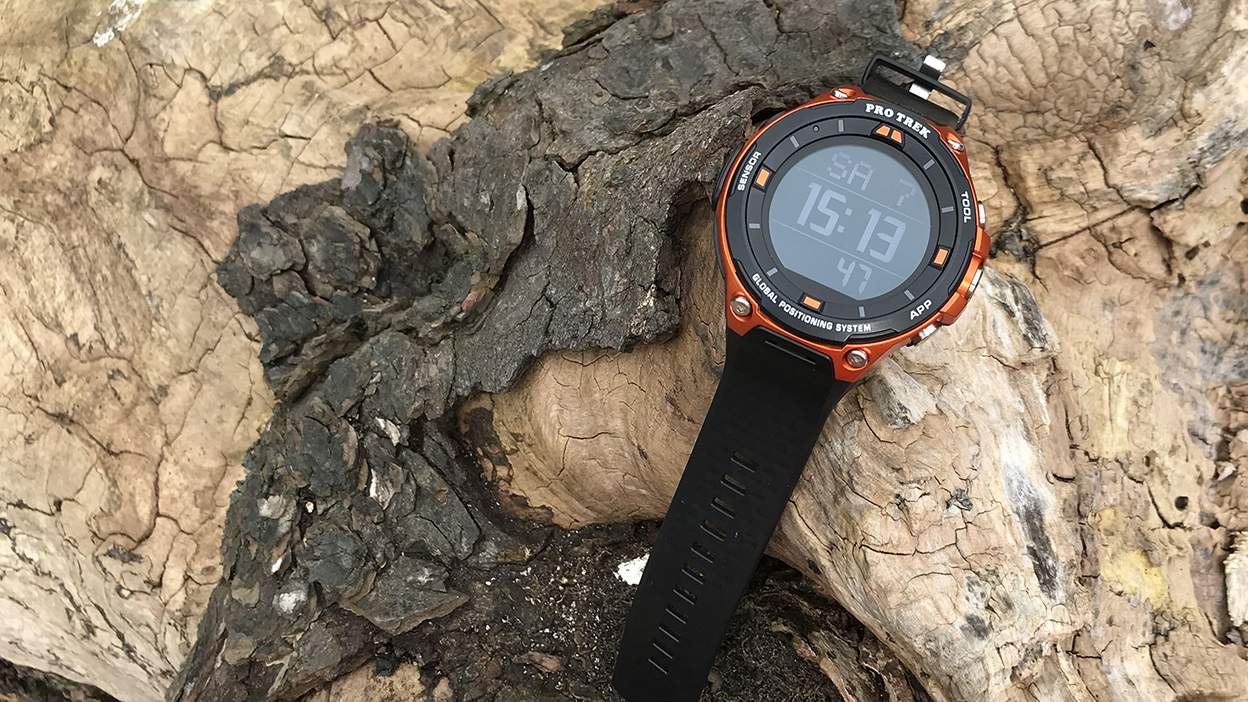
One surprising inclusion that we’d actually love to see in other sports watches is a built-in mic that lets you take notes and tag them to your current location. Ideal for capturing those eureka moments of inspiration you often unlock when you’re sucking in lungs full of fresh mountain air.
Color-wise, the Pro Trek Smart comes in straight-up black, black and green highlights, black and white, and black and orange (our favorite).
GPS, maps and tracking
- GPS, GLONASS and QZSS
- Supports offline maps
- Digital compass
An outdoor watch without good GPS isn’t a good outdoor watch. Luckily the Casio Pro Trek Smart performs well here. In addition to standard GPS there’s also GLONASS and QZSS, another satellite system that should improve the tracking should your adventures take you to Australia, Japan, Singapore and other parts of the world.
We found it quick to lock GPS (though we didn’t get to test it in Tokyo sadly) and overall the accuracy was solid. You can also use the apps on the watch to tweak the level of accuracy and frequency of calls to the satellites, to conserve battery. Useful if you’re hiking and you don’t need up-to-the-second read outs.
In the event you do lose GPS, really useful offline color maps let you navigate even when you’re out of signal. They were a little tricky to read on the small screen but to be fair to Casio, this is more a problem of the watch form factor over a phone or a dedicated GPS device rather than a Pro Trek Smart specific bugbear.
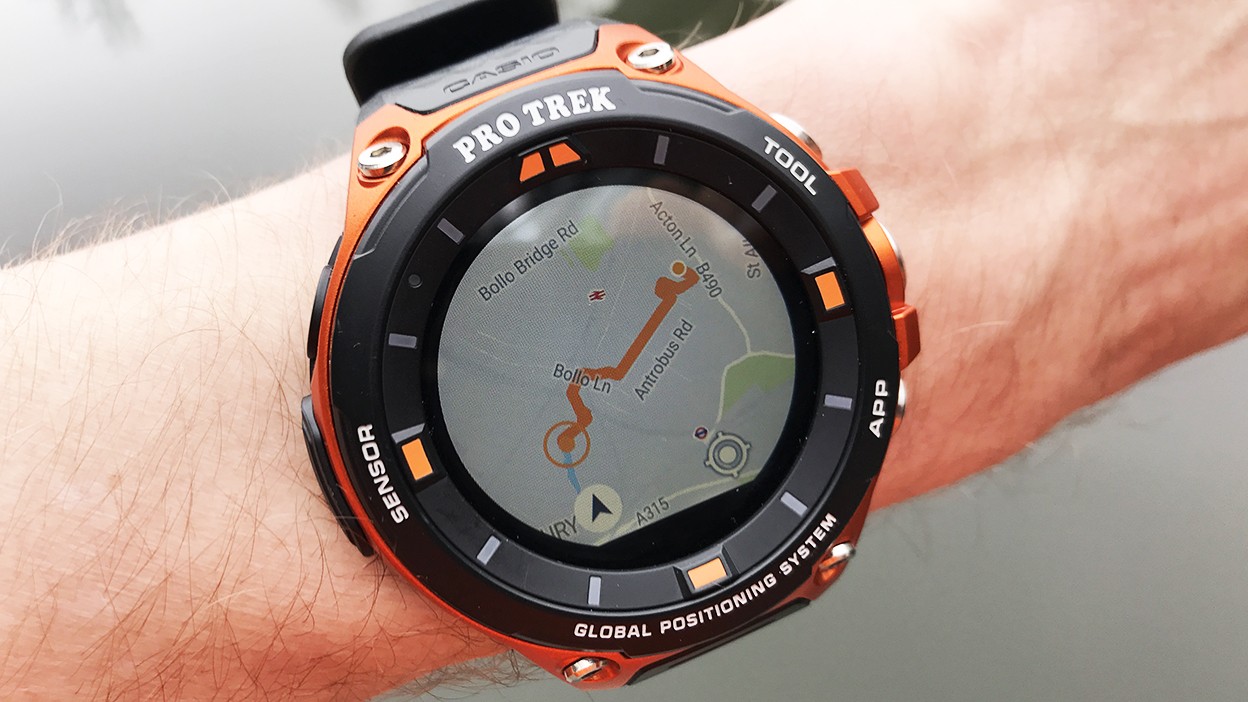
Casio's Location Memory app also saves the track you've taken and can be summoned to show you where you are at any time instantly with a single button tap.
The list of pre-loaded activities you can track using the GPS and other sensors feels a little bit limited. There’s trekking, skiing, canoeing and cycling – all fairly obvious – but including fishing over running and swimming is a bizarre choice.
If you want to track running, you’ll need to download one of the familiar running apps from the Google Play store. Though we doubt you’ll really want to run with this hulk strapped to your wrist.
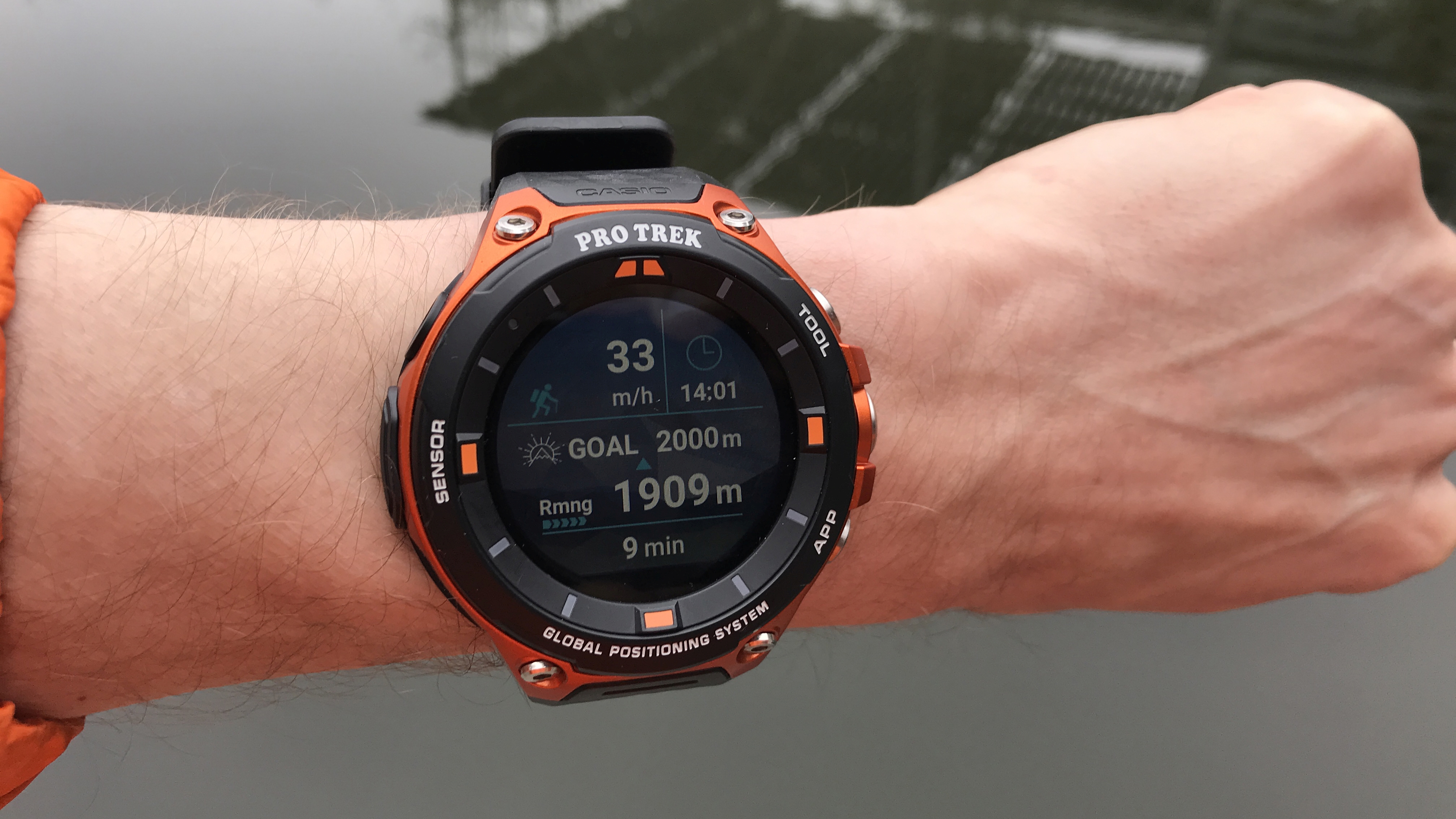
Another huge oversight is that post activity tracking data isn’t stored anywhere for review after an initial notification. So you can’t review what you’ve done over time on the watch.
One trick we thought was great was the ability to mark and store places of interest by dropping pins, in the Location Memory feature. Partly because this is great for logging excellent things you’ve come across while exploring but mainly because you can also assign an emoji, so you can remember all the smiley face places you’ve been.
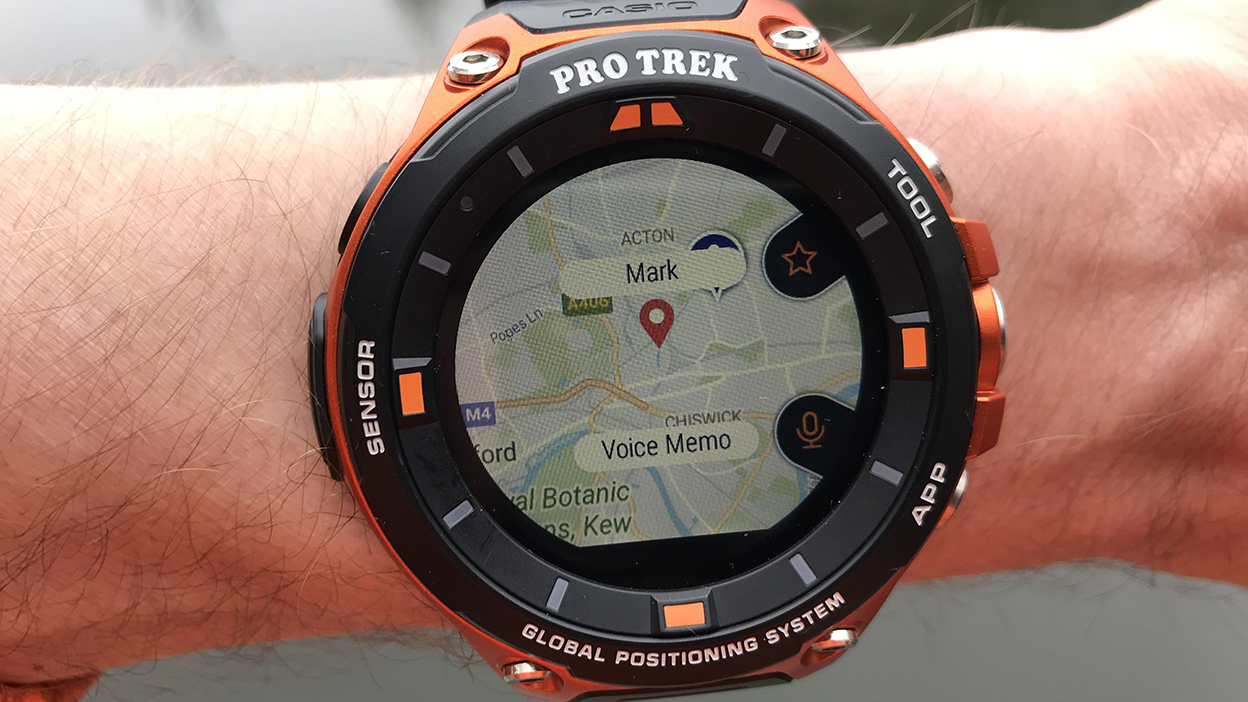
Interface and features
- Google Fit for general activity
- Moment Setter+ customized sport alerts
We’re not going to go into detail on all the features of Wear OS, that’s what this handy Android Wear guide is for but recent updates to Wear OS mean you can download apps straight to the watch and do things like access Google Assistant from the Pro Trek Smart.
Needless to say, you can also make the most of apps such as Google Fit for most general activity and fitness tracking such as step counting, and add other third-party apps to boost your Pro Trek Smart's skills.
We tested it with iOS and Android devices and though it plays nice with iOS, you get a smoother experience on Android. Shocker.
The watch face is customizable with a simple swipe left from the home screen and there are plenty to choose from. A swipe up from the bottom brings up your latest notifications from your connected apps.
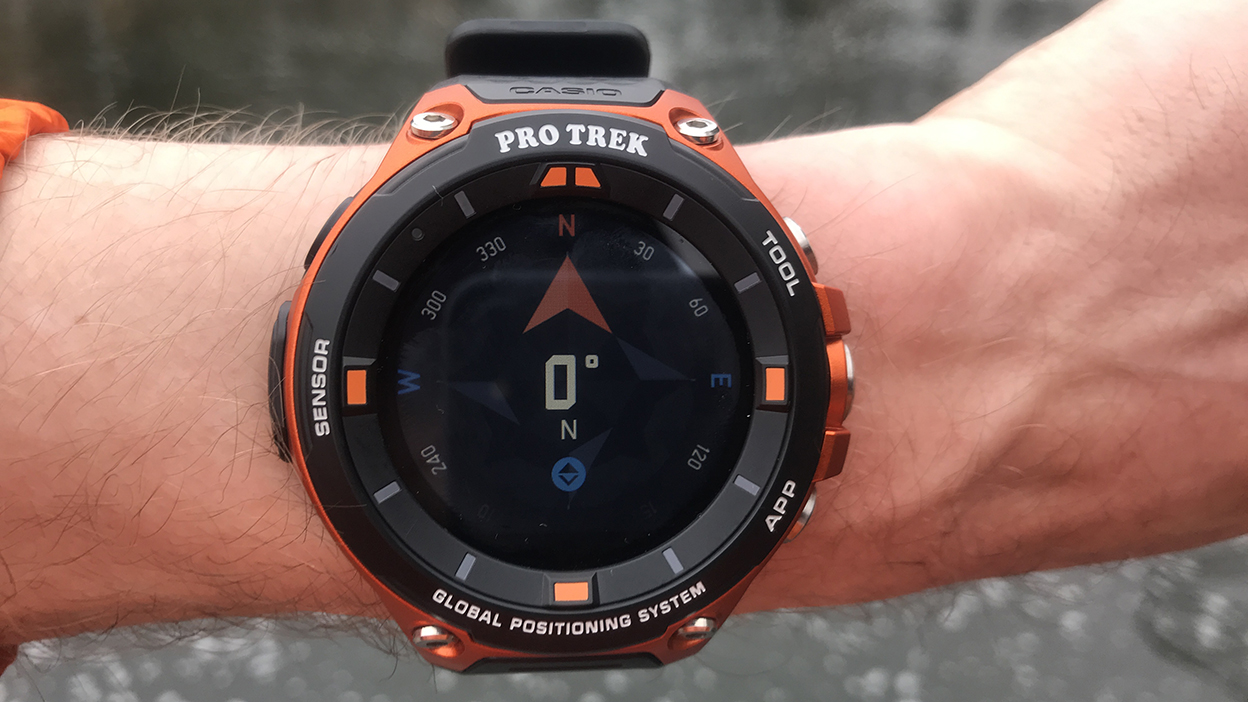
Hit the Tool button and you unlock all of the Casio Pro Trek Smart's sensor-powered insights including compass, altitude and air pressure. Plus tide graphs and sunrise/sunset info based on your current location. We tested the sunset (sorry, we weren’t up early enough to do sunrise) in an urban and rural location and it was spot on.
A tap of the App button loads up your map showing your current location, with the ability to search and add location specific notes. You can also see your location History here.
Another of the noteworthy features is Moment Setter+. This lets you assign specific notifications and actions for different activities. For example, every time you’ve cycled 5km, you can get a map to pop up on screen showing your distance traveled. Or you can set the screen to display your current altitude when you stop during a trek.
For those tackling endurance events you can even get the Pro Trek Smart to remind you to rehydrate or refuel every time you burn a set number of calories. All very useful indeed and again, something we’d like to see in regular running and cycling watches.
Battery life
- Around a day of life with mixed use
- Awkward, bulky charger
Casio doesn’t give out any official info on the capacity of the battery inside the Pro Trek Smart WSD-F20, but it does suggest you can get a day’s usage out of it, depending of course on what features you’re using and how much GPS tracking you’re doing.
In our tests, where we took the Pro Trek Smart off charge at around 8am and put it through an average day’s usage with an hour to an hour and a half’s GPS trekking tracking, we just about managed to get a full day.
With some tweaking of settings, for example flicking the display to monochrome mode, or reducing the GPS accuracy, it is possible to extend the life and eke out a little more than a day.
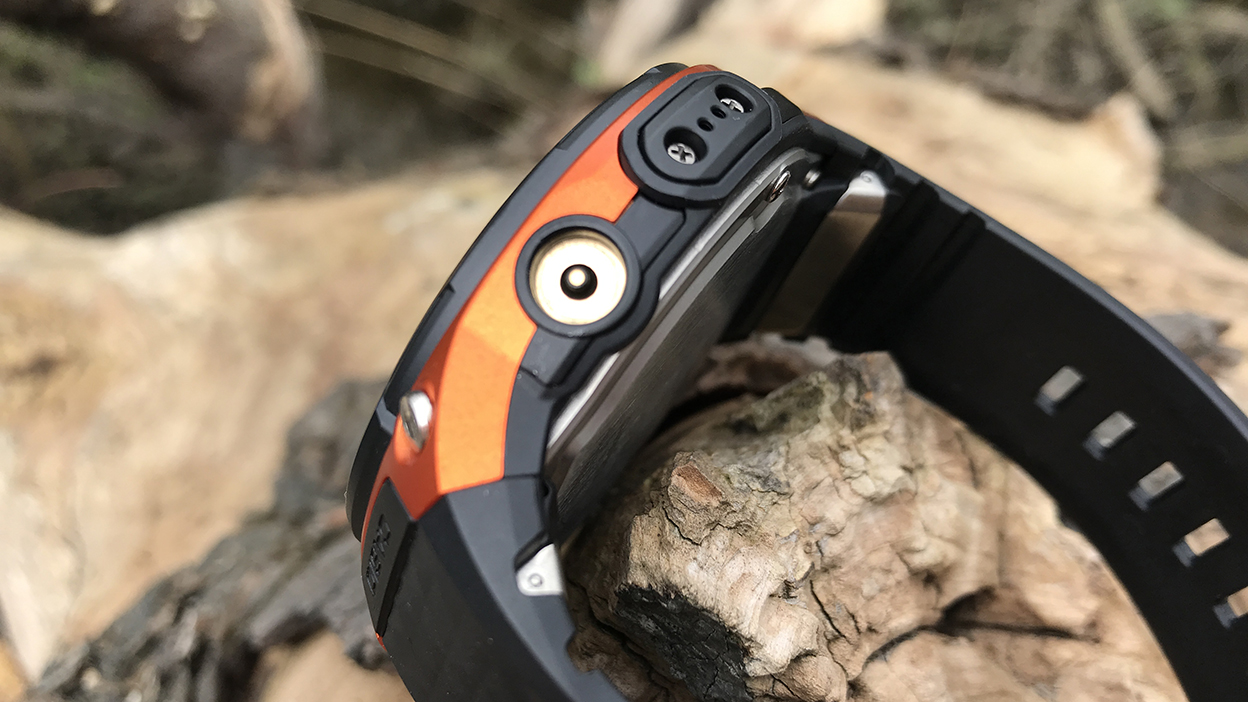
What it won’t do though is let you track GPS for hours and hours on end and that’s a potential drawback if you’re looking to buy this for day-long or multi-day hikes where you might not want to carry the weighty charger pack.
Speaking of which, when it comes to charging, not only does the Casio have the bulkiest plug we’ve seen on a watch charger for quite a while, but the power cord also docks onto the watch with a magnet clip that’s, well, not very magnetic and falls out at the slightest touch.
It’s actually really hard to get the cable to stay put and often we came back to find it had fallen out. This alone is enough to put us off buying the Casio Pro Trek Smart.
Verdict
If you’re a hiker who absolutely must have a smartwatch then the Casio Pro Trek Smart WSD-F20 is probably your best bet, but this really comes down to the fact that there aren’t many true smartwatch alternatives that cater for the outdoors adventure types, rather than the Casio actually being a quality watch.
It falls down on basic comfort and wearability and the shoddy charging cable is unforgivable at this price.
The Pro Trek Smart WSD-F20 isn't a complete disaster though, thanks to the likes of a durable build and useful navigation features.
Who's this for?
This is a watch for people who like to take to the hills, lakes, pistes and generally get involved in the kind of stuff the North Face heralds in its epic rugged photographs.
Oh, but they also want to be able to get updates from halfway up Mont Blanc when someone’s just dropped an important message into their Gmail/WhatsApp and liked their latest Instagram post.
Despite having all the features from the latest version of Wear OS, what the Pro Trek Smart isn’t, is a watch for those looking for a regular everyday smartwatch. As Marc Chacksfield quite rightly said in our review of the Nixon Mission, “it would be like wearing a suit to a sauna, total overkill.”
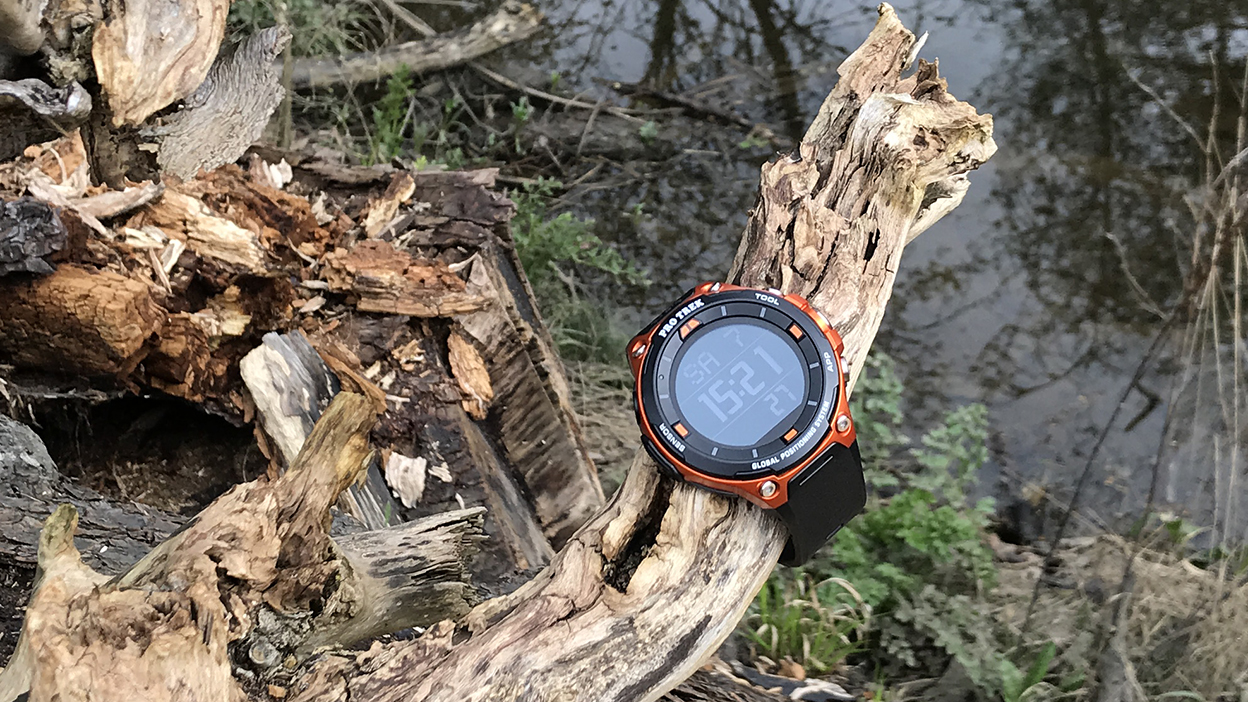
Should you buy it?
The short answer is no. Even though it’s quite unique as a Wear OS smartwatch that caters for more serious outdoors activity, and it’s definitely rugged enough to withstand a lot of ‘adventure’, there are too many flaws to justify the $500/£450 price tag, particularly when there are other watches (though not fully smart) snapping at its heels in terms of features.
So unless you’re either a huge Casio and Wear OS fan, or someone who likes bulky, rugged watches enough to forgive some major missing links, there are more capable watches out there.
First reviewed: April 2018
There are other options for outdoor adventurers, such as the following three watches:
Nixon Mission

The Nixon Mission is a beautiful looking, capable beast of an Android smartwatch. One of the most well-built smartwatches we’ve tried, it’s made to withstand the toughest water and snow conditions and excels in the extreme.
Sadly – but not uncommon in Android smartwatches – it’s let down by poor battery life and some missed feature opportunities, such as a heart rate monitor and NFC.
Read our full Nixon Mission review
Garmin Fenix 5X
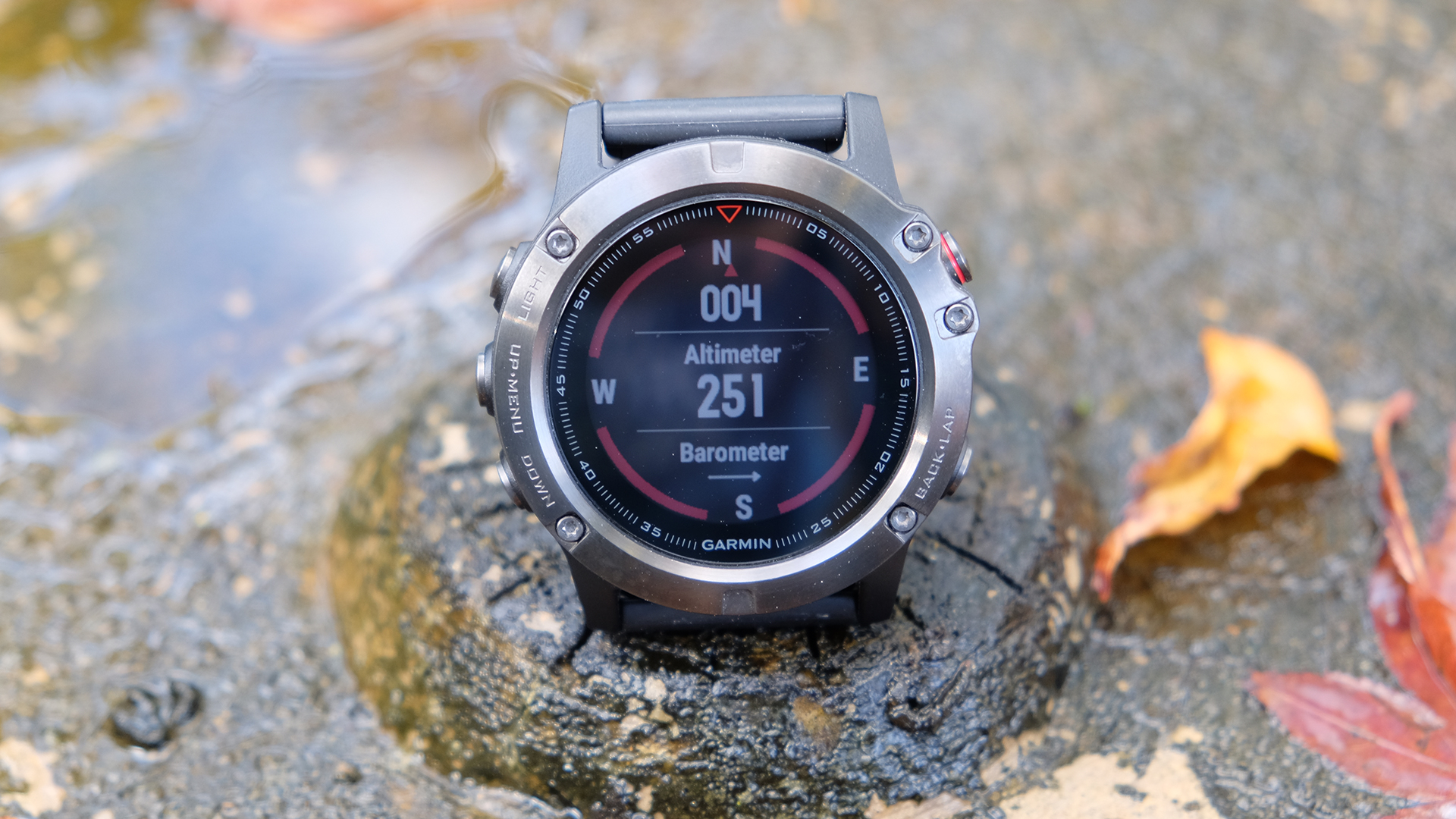
The Garmin Fenix 5X has an enormous number of multi-sport features, solid GPS, and a brilliant battery life all in an attractive albeit heavy build. It's not cheap, but for serious outdoor enthusiasts it's hard to beat.
Highlights include offline mapping, a hard-wearing sapphire screen and a Pro Trek-beating water resistance rating to 100 meters. If you want a GPS and activity tracker that does it all, this is worth the money.
Read our full Garmin Fenix 5X review
Suunto Traverse

It’s not brand spanking new and it doesn’t pack even half the smartwatch features that the Casio Pro Trek Smart WSD-F20 does, but the Suunto Traverse is a solid, rugged adventure watch that handles the outdoors with ease.
There’s GPS and GLONASS, automatic breadcrumb tracking so you can find your way back easily, route creation via the partner Movescount app and it’s good in the water up to 100 metres. Tides, sunset/sunrise and storm alerts are also on board. It won’t tell you your boss just emailed you, but who wants that when they’re busting a lung in the Pyrenees.
0 comments:
Post a Comment